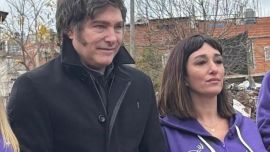The global vaccine market was estimated to be worth around US$60 million in 2020, as the world endured the global Covid-19 pandemic and raced to create an effective vaccine. Indeed, toward the end of last year, several major pharmaceuticals and a few nation states announced successful clinical trials and emergency approvals for several vaccines which led to a global immunisation campaign. Of course, global inequalities were clearly exposed, with rich countries gaining early access to the coveted antidotes. Counterintuitively (but in logical fashion), poorer countries were forced to pay higher prices to get their hands on the inoculations. Among them was the humble province of San Juan, which was forced to fork over 18 euros per jab, compared to 9.99 euros for the national government. As this column reported previously, Governor Sergio Uñac relied on a series of intermediaries to complete the operation, signing a contract with little-known German oil firm RuL AG that has led to a tug-of-war over the 18 million euros the province deposited in an escrow account and is looking to get back.
In an investigation for Perfil, reporter Brenda Funes last week received a statement from the Russian Direct Investment Fund, only hours after publishing her first piece, in which they called the contract signed with intermediaries for the Sputnik V vaccine “fake.”
“The information regarding a supposed agreement for the sale of the Sputnik V vaccine to the Argentine province of San Juan is fake. RDIF, the Gamaleya Center, and its partners have never signed agreements with that Argentine province nor [have they] authorised third parties to sign said agreements. The procurement of Sputnik V vaccines for Argentina is done only through the Argentine Government,” it read.
The bombshell statement suggested the operation was a sham, which seemed contradictory given the involvement of Pharmstandard, one of the most important Russian pharmaceuticals which is also an officially sanctioned producer of Sputnik V, and the fact that San Juan had deposited its cash in an escrow account with a renowned London firm, The Law Debenture Corporation, which is also publicly traded.
At the same time, sources told Perfil that the provincial operation counted with the support of the Alberto Fernández administration, with the direct involvement of multiple ministries and government agencies. Official sources at the Casa Rosada indicated they were aware of the San Juan purchase, but that they had warned against it.
“We were contacted by multiple intermediaries, all of them with opaque backgrounds offering extremely high prices which sometimes reached two to three times market values. With regards to San Juan, they consulted us and we informed them that the RDIF did not authorise third parties, they only negotiated state-to-state and that no one could guarantee the vaccines would arrive or that they wouldn’t be fake. But the province had a proposal it considered good, legitimate, and it moved forward. [From the national government] we are at their disposal to collaborate,” said a government source.
Thus, both the RDIF and the Argentine government turned their backs on the San Juan operation, leaving the governor on one hand and RuL AG — the intermediary — hung out to dry. Well-connected sources within the national government confirmed that they checked several offers that came through intermediaries with the original manufacturers and received the same response: “They didn’t work with intermediaries, their number one priority is state-to-state negotiations. Every offer outside of that circuit did not count with their backing.”
As mentioned previously, this also seemed to contradict reports by The Moscow Times which indicated the RDIF had “awarded an Emirati royal exclusive rights to sell its Sputnik V coronavirus vaccine to a host of countries in at least three continents in a deal that has seen buyers paying huge premiums for supplies.” It also goes hand-in--hand with another piece of information published by the same outlet indicating Russian vaccine exports had exploded to over US$300 million in the first five months of 2021, which is more than the sum of the previous three years combined. Sputnik V, of course, has been the leading product, but other jabs including yellow fever and the flu have contributed their part. The exponential growth of this market opportunity, combined with a global shortage of doses, seems like fair breeding ground for intermediaries and mark-ups, and their proliferation makes it unlikely that authorities at some level are unaware of their existence.
Several sub-national jurisdictions throughout Argentina have announced their own plans to procure Covid-19 vaccines. Both Buenos Aires City and the provinces of Buenos Aires, Cordoba, Mendoza, Salta and Jujuy have come out publicly with their plans to purchase the inoculations, yet not a single one has arrived to the country yet. According to Perfil’s reporting, none of these agreements were made via intermediaries, and the national government is expecting the manufacturers to respect its expected delivery times before supplying the provincial jurisdictions.
As the rate of vaccine imports and the inoculation campaign accelerates, several potential buyers have suggested they no longer want nor need doses. Last month, Argentina imported a record 16,892,200 doses and applied over 11 million vaccines. After peaking in May, daily cases have slid from over 40,000 to less than 14,000, while deaths have fallen to figures not seen since the end of summer. With the electoral campaign underway, the Fernández-Fernández administration is betting on “a month of second doses,” new Buenos Aires Province Health Minister Nicolás Kreplak noted, with his former boss having left the portfolio to become a candidate for the upcoming midterm elections. In the opposition, the campaign speech has shifted from accusing the government of ideologically rejecting the Pfizer jab to the economic situation.
Covid-19 is very much alive, as the rest of the world shows, and the Delta variant is already making its rounds in Argentina. With the political calculation shifting from Covid to the economy, the stock of vaccines is slowly sliding into a second or third place in people’s minds. Hopefully, when the third and fourth waves come, we’ll be ready.




















Comments